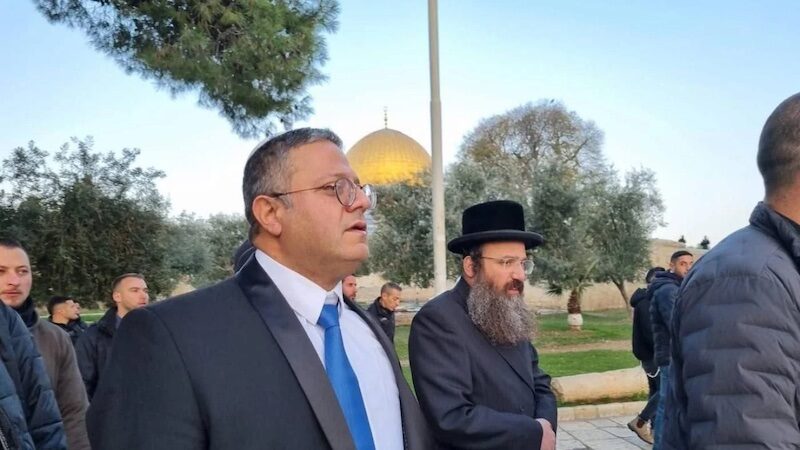
© social mediaIsrael's National Security Minister Itamar Ben Gvir visits Al-Aqsa, 3 January
far-right national security minister, Itamar Ben-Gvir, entered
Al-Aqsa Mosque's courtyards in occupied East Jerusalem on Tuesday, in a move bound to inflame tensions.
A
video posted on social media shows Ben-Gvir touring the courtyards with a heavy security detail.
On Monday, the Palestinian movement Hamas warned
Israel that it "won't sit idly by" if the new security minister visits Al-Aqsa Mosque, as he
vowed to do on Sunday.
Following his visit on Tuesday, Ben-Gvir said: "Our government will not surrender to threats from Hamas.
"The Temple Mount is the most important place for the people of Israel," he said, using the Jewish name for the site.
"We maintain the freedom of movement for Muslims and Christians, but Jews also go up to the site, and those who make threats must be dealt with an iron fist."
Al-Aqsa Mosque is one of the holiest sites in Islam and the site of the Jewish temple destroyed by the Romans in 70 CE.
Since Israel occupied the site following the 1967 Middle East war, Jewish prayer at the site has been forbidden,
though far-right settlers such as Ben-Gvir (some of whom want to demolish Al-Aqsa and replace it with a third Jewish temple) have frequently prayed there under strict security in recent years.The Palestinian Authority's foreign ministry, which is run by Hamas' rival Fatah, said in a
statement that it holds Israeli Prime Minister Benjamin Netanyahu "responsible for Ben-Gvir's storming of Al-Aqsa and its consequences".
It went on to add that it
"strongly condemns the extremist minister Ben-Gvir's storming of the blessed Al-Aqsa Mosque and considers it an unprecedented provocation and a serious threat" to regional stability.
On Monday, Yair Lapid, who Netanyahu last week replaced as prime minister, slammed the planned visit, calling it a "
deliberate provocation" that would result in people dying.
Lapid urged Netanyahu to restrain his new national security minister.
Initial reports in the Hebrew media indicated that Netanyahu and Ben-Gvir had agreed to postpone the visit. However, Netanyahu's Likud party denied that such a request had been made.
International reactionsThe United Arab Emirates, which normalised relations with Israel in 2020, released a
statement condemning the storming of Al-Aqsa.
"The UAE today strongly condemned the storming of Al-Aqsa Mosque courtyard by an Israeli minister under the protection of Israeli forces," said the statement, avoiding naming Ben-Gvir.
The statement called on, "Israeli authorities to assume responsibility for reducing escalation and instability in the region."
It continued: "Moreover, the Ministry stressed the need to support all regional and international efforts to advance the Middle East Peace Process, end illegal practices that threaten the two-state solution, and establish an independent Palestinian state on the 1967 borders with East Jerusalem as its capital."
The
French embassay in Israel called for the "preservation of the status quo of the Holy Places of Jerusalem. Any gesture aimed at questioning it carries a risk of escalation and must be avoided."
According to Israeli
media reports, the US Ambassador to Israel, Thomas Nides, warned the Israeli government to preserve the status quo at the holy sites in Jerusalem. "Actions that prevent this are unacceptable," Nides is reported to have told his Israeli counterparts.
Jordan's Foreign Ministry also summoned Israel's ambassador to Jordan.
"Jordan condemns in the severest of terms the storming of the Al-Aqsa mosque and violating its sanctity," said a statement by the foreign ministry.
Jordan has been the
official custodian of Christian and Muslim holy places in Jerusalem since 1924, when Sharif Hussein, the initiator of the Great Arab Revolt against the Ottoman Empire, was publicly acclaimed as the custodian of Jerusalem's holy sites.
Even after Jordan relinquished its claim to sovereignty over the occupied West Bank in 1988, it never abandoned its custodianship of holy places in Jerusalem.
According to the Saudi news outlet
Al-Arabiya, the kingdom's foreign ministry also reprimanded Israeli actions.
"Saudi Arabia condemns the provocative action of an Israeli official who stormed the courtyard of al-Aqsa mosque," the foreign ministry said.
The kingdom also noted, "The Israeli occupation authorities' practices which undermine the international peace efforts, and [violate] international principles and norms regarding respecting religious sanctities."
Changing the status quoHamas spokesman Abd al-Latif al-Qanua said on Monday that the planned visit was "another example of the arrogance of the settler government and their future plans to damage and divide Al-Aqsa Mosque".
"The Palestinian resistance will not allow the neo-fascist occupation government to cross the red lines and encroach on our people and our sanctities."
Netanyahu's sixth government, the most right-wing administration in Israel's history, has said that its main guiding policy will be that "the Jewish people have an exclusive and indisputable right to all areas of the Land of Israel", referring to the concept of "Greater Israel" that includes the occupied West Bank, East Jerusalem and other foreign lands.The deadliest year for West Bank Palestinians since the Second Intifada in numbersThis is not the first time that Ben-Gvir has stormed Al-Aqsa.
In May last year, accompanied by his wife and son, Ben-Gvir posted a picture calling for the destruction of the site to "establish a synagogue on the mountain".When former Israeli prime minister Ariel Sharon made a similar trip to the site in 2000, it sparked the Second Intifada Palestinian uprising. According to
data compiled by Middle East Eye, Israeli forces killed more Palestinians in the
occupied West Bank in 2022 than in a single calendar year since the
Second Intifada.
At least 220 people have died in Israeli attacks across the occupied territories, including 48 children. Of the total death toll, 167 were from the West Bank and East Jerusalem, and 53 were from the Gaza Strip.
An additional five Palestinian citizens of Israel have been killed in the same period. Meanwhile, Palestinians have killed at least 29 Israelis, including one child, the highest death toll since 2008.
Reader Comments